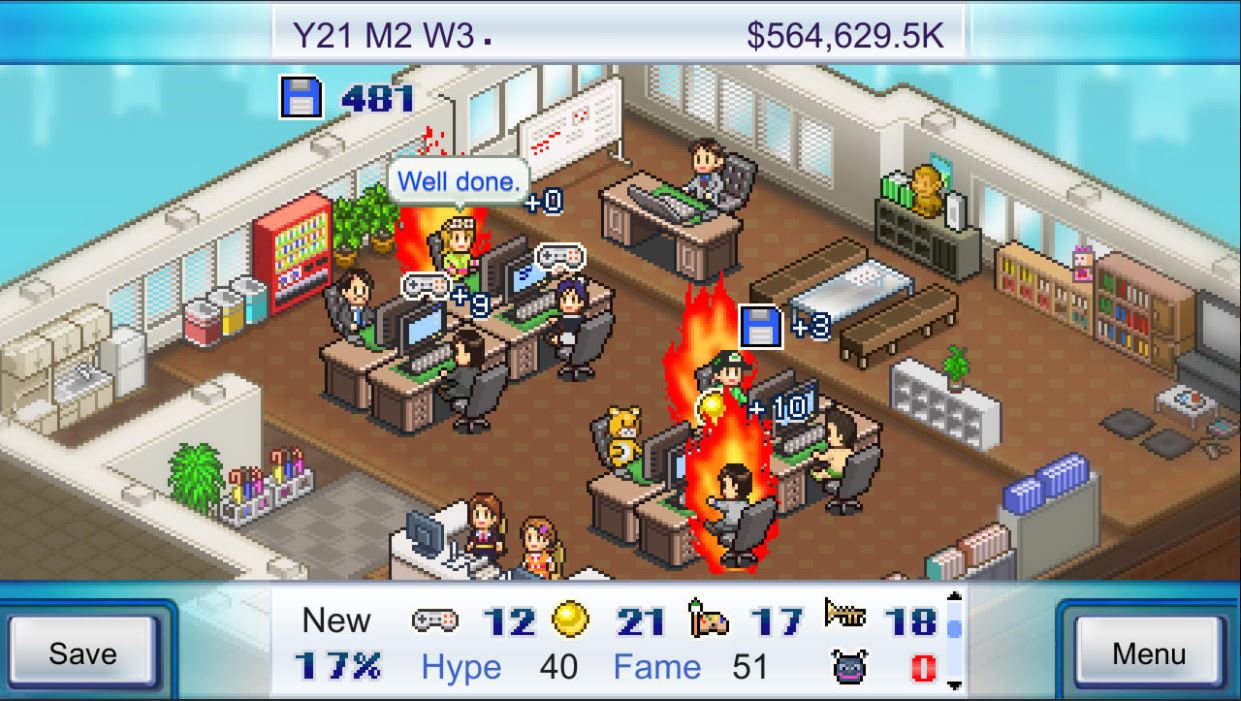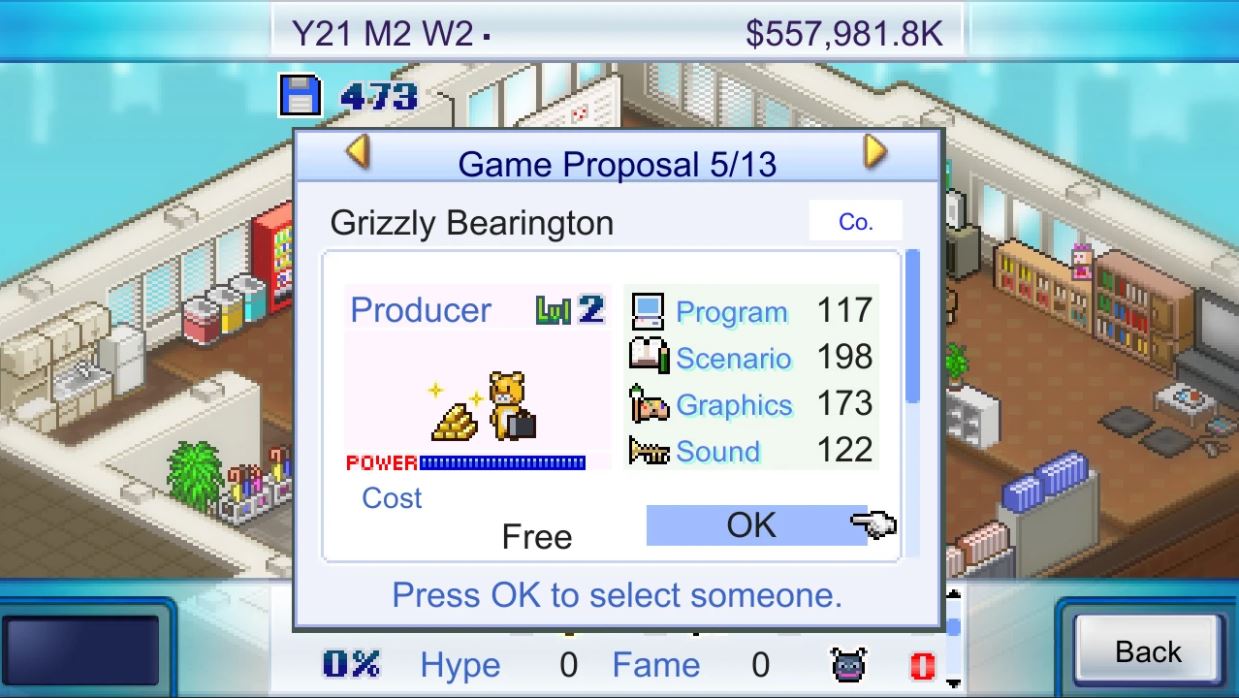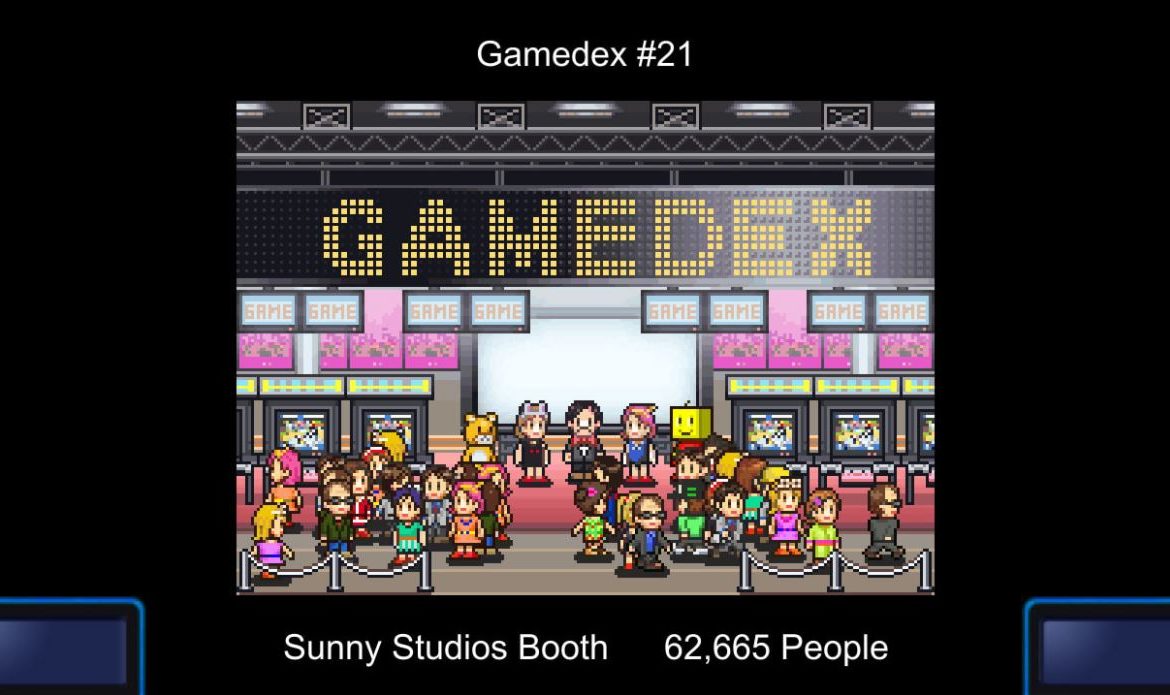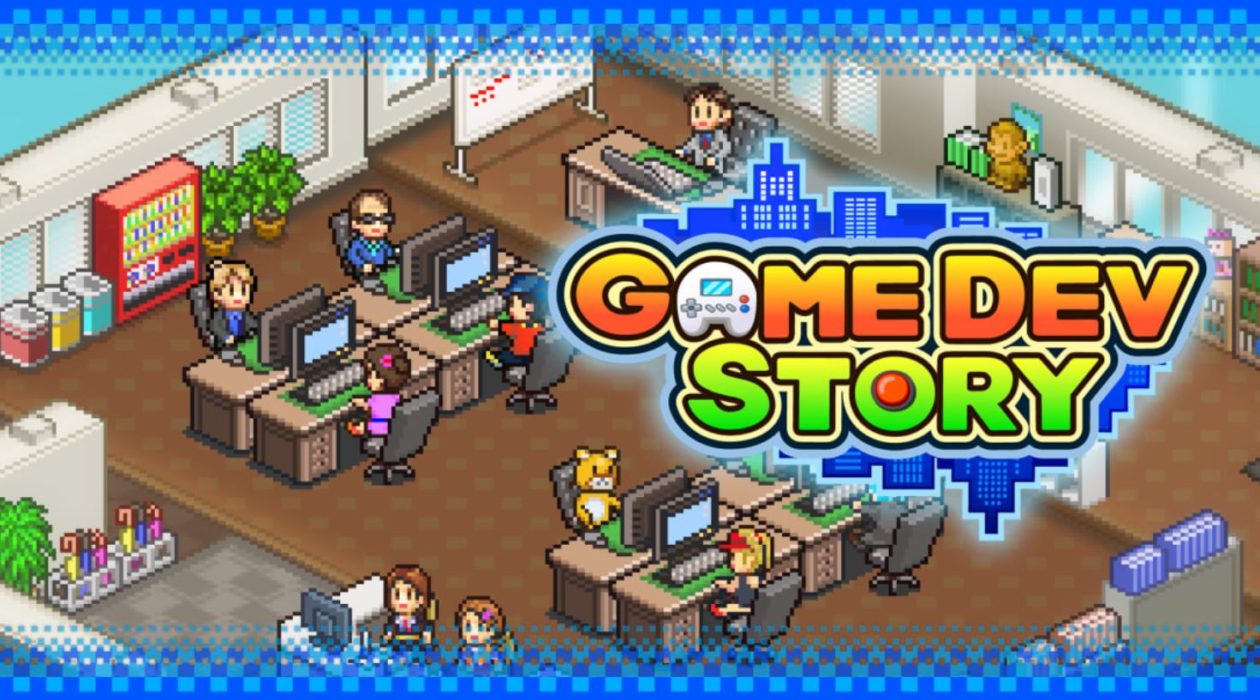It’s almost embarrassing the number of times I’ve bought/played Game Dev Story. It’s probably rivalling the shameful number of times I’ve rebought Sonic 2 on different platforms at this point. I originally got hooked on this game over a decade ago when it launched on Facebook. Back then, it was rife with the grating issues that plagued the early social media game boom. “Recruit your friends!” It would demand regularly, stalling your progress if you didn’t oblige. Even with these blemishes though, you could tell there was the heart and soul of a great game in Game Dev Story. Casting off those annoying Facebook chains a few years later, this game went on to release on all mobile platforms, the Nintendo Switch and now PlayStation 4. Of course I felt compelled to buy it again. Yes, it’s still a lot of fun.
The premise of Game Dev Story is simple. You’re running a game development studio and it’s up to the player to decide what to develop, who it’s developed by and what platform to release the game on. The game begins as the game industry is entering its bloom. Your studio is small with the space for 4 employees and you’ve not yet reached that capacity. From your static overhead view, the game guides you through staffing up through recruitment and starting development on your first game.
The game play loop for Game Dev Story is (and I tend to avoid using this word but there’s no other that would do it justice) addictive. When you choose to develop a new game, you’re given a series of choices to make. The first is the genre. Action, adventure, RPG, simulation, racing and many more. Next is a theme – Pirate, animal, ninja, dating, hunting, etc. Once you’ve decided what type of game to make, you’re able to decide some of the nitty gritty direction of the game. With a limited amount of points, the player gets to allocate them to certain aspects that might work with the genre and theme. Realism, cuteness, game world, niche appeal, approachability polish, simplicity and innovation are all elements you can ask your staff to focus their direction on.

Selecting a genre and theme that work well together is important. Making a fantasy based RPG is likely to be more enticing to customers than say, a skiing puzzle game. The game will tell you as much and it’ll be reflected in the sales once the game is published. That’s not to say you shouldn’t experiment in Game Dev Story. The more you use a genre and theme, the better the studio gets at making those games. The experience will result in a level up (up to a max level of 5) for that particular game genre/type and will allow more points to be used when indicating direction. The more you branch out to new genre’s and themes, the more levelling up you’ll do and the more points you’ll have when defining a direction.
The quality of a game is built up through development over stages and is measured in 4 different metrics. These are game play, creativity, art and music. The whole process begins with the outlining of a scenario which can be done by either one of your staff or a freelancer (who come at a cost). Then it’s on to the alpha phase where game play is worked on. The whole team works on this over a period of time. At the end of this phase, you get to employ a member of your staff or a freelancer to design the art work. This leads to Beta development, again involving the whole team. Next is sound design, again by a member of your team or freelancer. Finally, any bugs that are built up over development are squashed before the release.

All of this is done by your team with limited interaction from the player. They go about their development, icons popping up from their pixelated heads as they increase the quality stats of the game. Time will stop each time the player needs to make a decision on art, sound etc but ultimately, you can sit back and watch the studio go to work. It’s quite a satisfying view, to be frank. There’s a simple gratification in the icons popping up and, despite the player having very little input in making it happen, it’s exciting when one of the crew gets on a hot streak and adds big additions to the game scores.
A Game Dev Story game can only be as good as the team that are working on it however. Each member of your staff (and freelancers) have numerical values attached to their skills in programming, scenario, graphics and sound. The higher the value of these stats, the more they contribute to the game play, creativity, art and music in the game at each stage of development. Throughout development and especially during the last phase of bug squashing, the staff also earn research points. These can then be spent by the player to level up each member of staff (to a total of 5) which increases their skill (but also their wage demands). You can also pay to send staff on various media training courses which again, increases their skills. By doing so, they can contribute more to the quality of a game, engaging in the game play loop. Each member of staff has their own ceiling however, so sometimes you’ll have to do some firing and hiring for new staff.
As the staff get more skilled or you recruit those with higher base stats, new game genres and themes become available more forward. Genre’s like RPG can’t be crafted by lower skilled staff but once they’re unlocked, can lead to bigger returns.
Once a game is completed (or even if it isn’t but you want to ship it anyway), you can give the game a name and send it out to critics. 4 games journalists award if a score out of 10 and the cumulative total often determines how well the game will sell. The higher the values for the game play, creativity, art and music, along with the cohesion of genre and theme, the higher the review score will be. It’s then made available for sale and you can (hopefully) start to make a profit. Make it into the top ten charts or make a game with a high review score and it’ll sell big numbers. Everything costs money in Game Dev Story – from game development, annual wage fees to attending GameDEX, the yearly game trade show – so it’s important to at least earn back your investment. Make a game, sell the game, reinvest in a new game. The loop feels excellent and is easy to get invested in.
Some wise real world game developer (I think it was Mike Bithell) once said that half of getting success in the game industry is timing and luck. That’s true in Game Dev Story. Over time, new consoles will release which take up a big market share. To develop for those new consoles, you’ll need to pay a licencing fee which can cost more than just one game can earn – but will it pay off? Older consoles will age out and cease to be viable platforms. Fans you’ve earned over time will get older and you’ll maybe need to advertise to a younger demographic who’ve never heard of you. Strapped for cash? Take on some timed contract work instead of diving head first into your next game development. Beware of spending too long without releasing a new title however. Go quiet on that front and you’ll lose some fans. Random events like power cuts or other developers hitting the market before you with a similar game can decimate a potential hit. There’s a complex web of stats and systems that underpin how a game will sell and whether you’ll hit success. All of it is distilled down into an easy to use system that’s incredibly moreish.

Despite the relative complexity of Game Dev Story’s systems, everything is portrayed as light hearted parody or with irreverence. Each new console is a pun or pasquinade of reality; The Sonny PlayStatus, the Intendro Woops, the Senga Game-Box. At the yearly awards show, you’ll see homages honoured for their quality that are just the right side of copyright infringement. Some of the staff names are riffs on celebrities: Walt Sidney, Donny Jepp, Stephen Jobson. Even when you’re failing at the game, it’s hard to get angry at it because it’s so charming and full of character.
My only complaint with the core content of Game Dev Story is the same in 2021 as it was in 2015 – The later parts of the game feel too easy. As you progress and make better games, you’ll move to new offices which allow you to hire more and more staff. This, in turn, allows you to make better games. So long as you’re always careful with your genre and theme choices, it’s easy to rake in the cash. You’ll never feel threatened by the ever rising console licencing fees and you’ll have enough in reserve for the occasional random event to tank your current project. It’s at this point that the game becomes simply repetitive. Unless you’re taking on risky moves (like developing your own games console before you’re ready), the game will feel too safe and the play loop starts to lose its appeal. Sure, this will be many hours into a run but it will happen.
With the PS4 version, I have another comment to make. Aside from the Facebook version which was admittedly a product of its time, this PS4 version is the worst way to play Game Dev Story. The controls for this game have always felt at home with a mouse or a touch screen. Using a Dualshock/Sense controller doesn’t feel at all natural. The necessity to map the shoulder buttons to some of the menu options removes some of the tactility that this games UI has on other platforms. Accidentally pressing X while the lower menu, which is now controller via the sticks, will sometimes bring up the “Ship Game?” or “Cancel game?” option. This puts you one click away from accidentally losing a lot of progress. The porting job itself is admirable and after some time, the controller scheme is easy to get accustomed too. I couldn’t help but wish for a touch screen when playing this version however.
Despite this version of Game Dev Story taking some time to get used too, the addictive “just one more game” loop remains unchanged. The hook of this game is as compelling as it was when the game first released. If you’re after a passive yet engaging game to play on your PS4, this game is certainly worth your time.

Game Dev Story is available now on PS4 (review platform), Nintendo Switch and mobile platforms.
Developer: Kairosoft
Publisher: Kairosoft
Disclaimer: In order to complete this review, a copy of the game was purchased. For our full review policy, please go here.
If you enjoyed this article or any more of our content, please consider our Patreon.
Make sure to follow Finger Guns on our social channels –Twitter, Facebook, Twitch, Spotify or Apple Podcasts – to keep up to date on our news, reviews and features.
